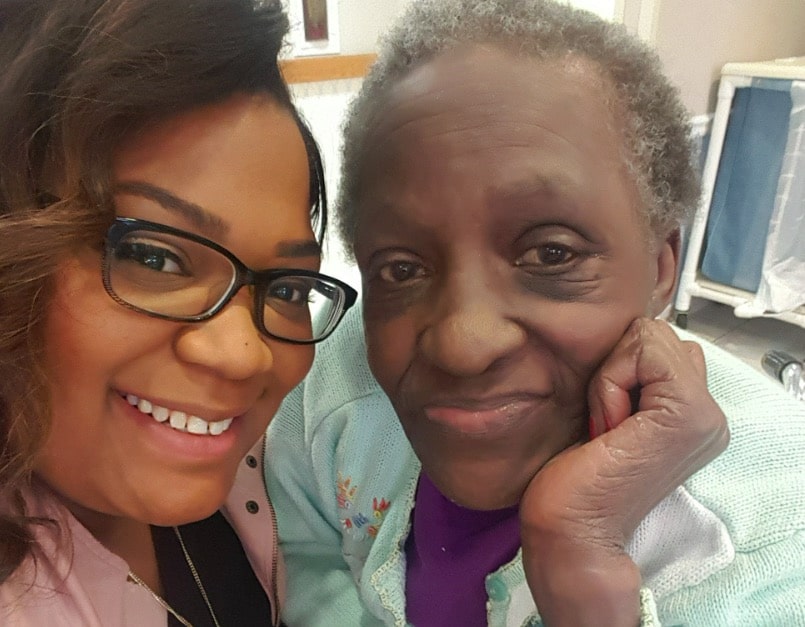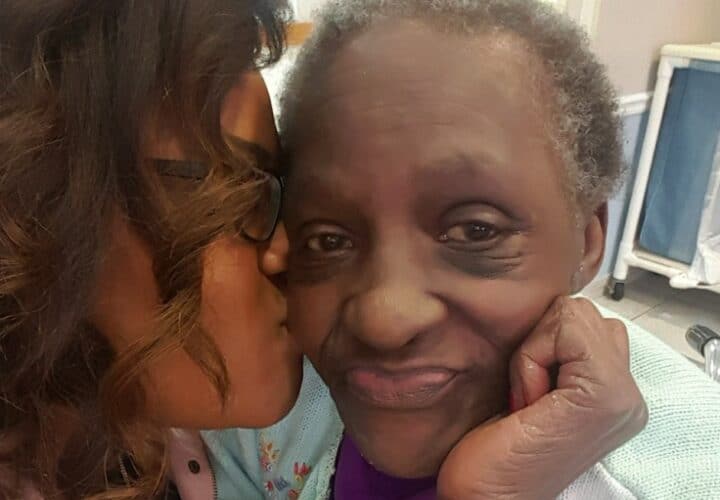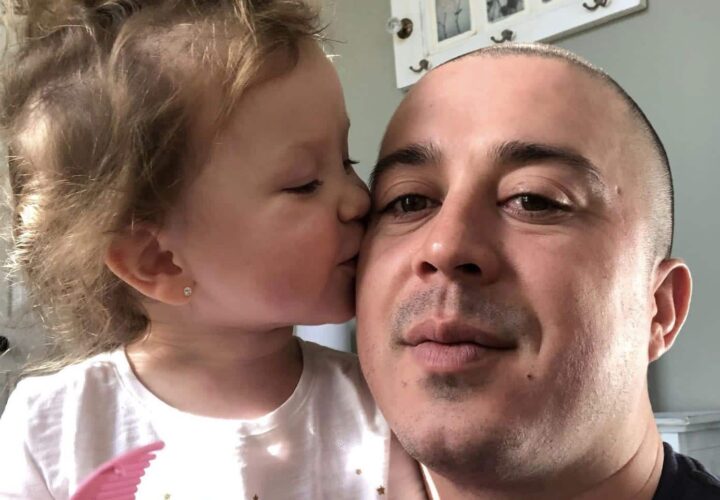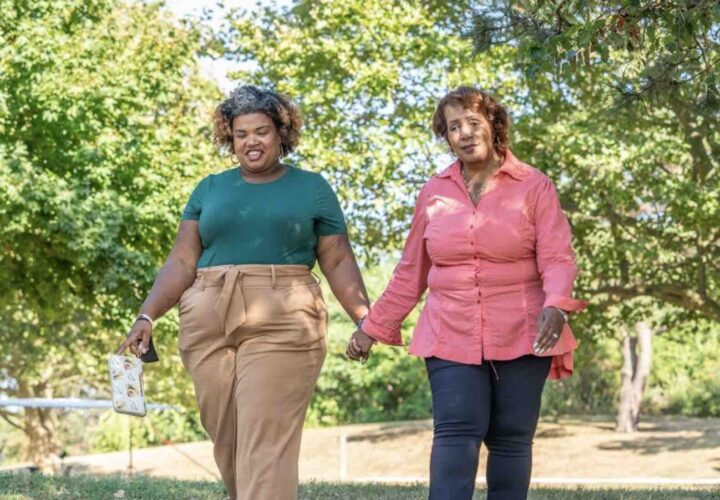Sherita Jenkins faced a lack of support as she cared for her late mother with dementia. Now, her caregiving experience is a beacon for other families on a similar path.
This article is part of the series Diversity & Dementia, produced by Being Patient with support provided by Eisai. IMAGE: Sherita Jenkins and her mother Bettye, courtesy of Sherita Jenkins.
Sherita Jenkins says she never remembered talking about Alzheimer’s or dementia in her family. Instead, she said, she believed they were “just getting old.”
But when her mother, Bettye Jones, came to visit her in Iowa from her home in Georgia for Mother’s Day in 2016, that’s when she first noticed something was wrong.
Her mom was withdrawn and their conversations were surface-level at best, she recalled. Aside from the initial signs, her mother began to fall often, Jenkins said, and was not remembering if she had eaten or not. She was also becoming increasingly combative.
“I honestly just didn’t know what it was. It never even dawned on me that cognitive impairment would’ve caused these things,” Jenkins said.
Concerned about her mother’s diabetes and meal schedule, Jenkins decided to take her to the doctor, and at first, the doctor never mentioned any suspicion of cognitive impairment. About a month after their initial appointment, Jenkins said, she asked if there was something else going on.
High blood pressure and diabetes, known risk factors for Alzheimer’s disease, are also more prevalent in the African American community, according to a 2020 Alzheimer’s Association report. And research shows that those with diabetes have about a 75 to 100 percent higher risk of dementia.
“That’s the first time he had ever mentioned, or anyone ever mentioned, anything about Alzheimer’s or dementia. But once he said ‘I believe this is all cerebral dementia,’ he didn’t give me any other resources,” Jenkins said.
“What bothered me the most about my mom’s situation, and I think what happens to most African Americans, is that no one is telling us what to do or what our options are.”
Her suspicion is not unfounded: African Americans are two times more likely than white Americans to have Alzheimer’s, yet are only 34 percent more likely to receive a diagnosis. Compared to in white populations, Alzheimer’s is normally diagnosed at later stages of the disease in African American communities. And once families do have their diagnosis, less access to quality brain healthcare in communities of color means that guidance on next steps is often limited.
Jenkins wanted to help bridge that gap in her own community. Today, she is the manager of community volunteers for the Alzheimer’s Association in Cedar Rapids, Iowa, where she manages the program to ensure that all volunteers are following the guidelines of the association and providing assistance and education to the community.
“I want to be a voice for the African American community,” she said, adding that her goal is to find volunteers in underprivileged and underserved areas so they can be educated and educate others.
She hopes that more education for disproportionately affected communities could help ease burdens on family caregivers.
“In my mind, that’s the only way they will get the message and be interested in hearing more — because it is coming from somewhere within their culture, within their community,” she told Being Patient. “There are so many other people who could be struggling with the same thing, encounter the same thing, but at least they’ll have the resources that they need to be able to deal with it better than I did.”

***
When Jones was 74 and broke her hip one night, she needed surgery and rehab. Although Jenkins thought her mother would be able to come home and walk again shortly after, that was never the case. Jenkins describes the change in her mother while in rehab as a “big shift” from where she was when she left home after the accident — it was time for a nursing home.
After Jones moved into the home, Jenkins received complaints from the staff. Jenkins said these reports were that her mother was “terrorizing the entire nursing home,” “hitting people” and being “combative” — in line with personality changes that are not uncommon in people with dementia.
“At some point you have to think, maybe she’s telling you what she wants,” Jenkins said of these changes.
The situation spiraled, and one day, when her mother was hospitalized for an infection, Jenkins got a call: The home was involuntarily discharging her mother on account of aggression, Jenkins recalls. She was at the emergency room, with nowhere to go.
Jenkins said the hospital moved her mother into a regular room until Jenkins, who works full time, was able to find other care, but the search went on for weeks, leaving hospital bills to pile up day by day. She struggled with not only financial resources to pay the bills, but also Medicare paperwork that had fallen then through the cracks.
After financial struggles, emotional struggles, and even legal action, eventually a caseworker assisted Jenkins in finding a nursing home in Cedar Rapids, only half an hour from home. But Jones’s health declined, and she passed away in November 2017.
One year later, Jenkins found the Alzheimer’s Association. Through this community, she said, she has been able to help others receive the education and resources that she felt she lacked when navigating her mother’s diagnosis.
Now, she remembers her mother through her work, assisting families by helping them find support groups, whether as caregivers or those living with Alzheimer’s, and although their goal is also to help fundraise, she describes the volunteer program as their “tiered support arm.” Everyone must be aware of the warning signs, she said, because families might otherwise never know when a loved one needs help. Her only regret, she said, is that she wasn’t knowledgeable about dementia earlier, and that her mother suffered alone.
“We just rally together as a family and take turns, but nobody knew the warnings and that [my mother] was struggling for years,” she said. By the time she had any idea what was happening, Jones was already in her end stage. She wants to help spare other families that grief.
“There are 66,000 Iowans who have some form of Alzheimer’s or dementia and our organization only serves 10 percent of those people,” Jenkins said. “We have work to do.”



